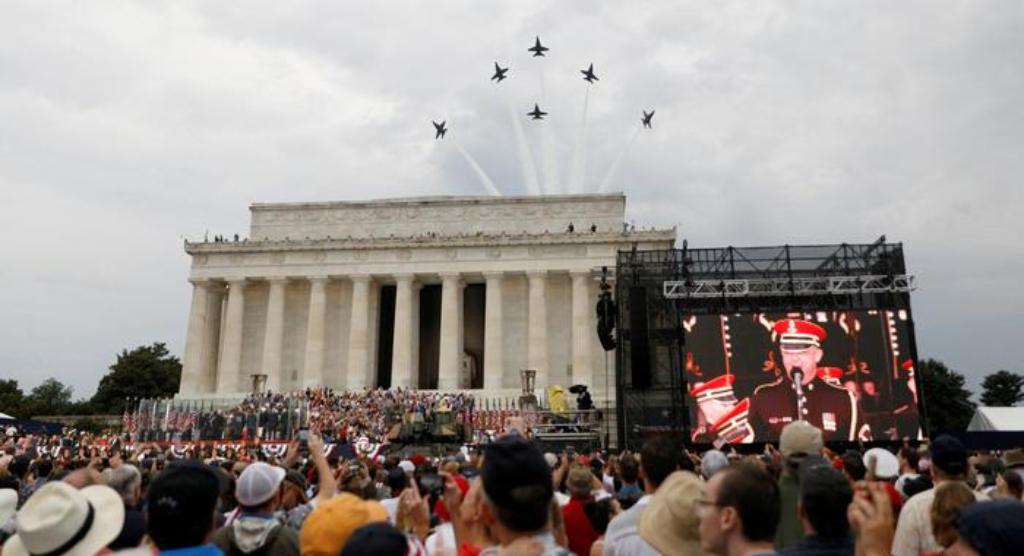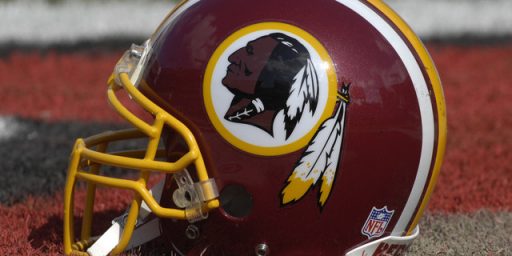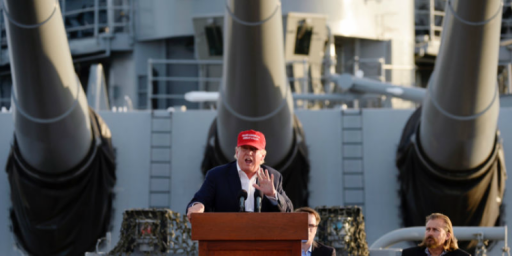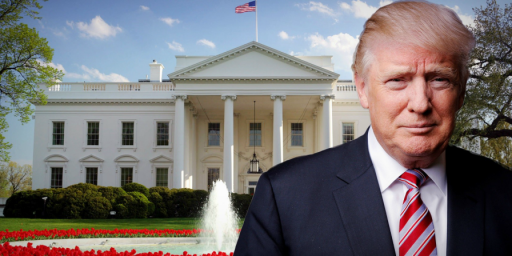Washington, D.C. Wants Reimbursement For Costs Of Trump’s July 4th Rally
Trump's self-congratulatory July 4th nonsense bankrupted the District of Columbia's security fund, now they're seeking reimbursement.

The District of Columbia is asking the Federal Government to reimburse the city for the costs it incurred during President Trump’s self-congratulatory July 4th event:
Washington, D.C., Mayor Muriel Bowser has asked President Donald Trump to reimburse the city for approximately $1.7 million in costs related to his July 4 “Salute to America” celebration that featured military displays and a Trump speech.
Bowser said in a letter to Trump dated Tuesday that the city’s expenses for the celebration, including police assigned to demonstrations, will further deplete an emergency fund intended to protect the nation’s capital from terrorism and to provide security for special events. The mayor said the fund, which was never reimbursed for $7.3 million in expenses related to Trump’s 2017 inauguration, would have a $6 million deficit by the end of the fiscal year in September.
“As we continue to gather estimates for the next Inauguration, we ask your help with ensuring the residents of the District of Columbia are not asked to cover millions of dollars of federal expenses and are able to maintain our high standards of protections for federal events,” Bowser wrote.
Trump’s Salute to America has drawn heavy criticism for injecting politics into what has traditionally been a nonpartisan celebration, and for its military extravagance.
Last week, it was reported that the National Park Service would divert $2.5 million from its already strapped budget to help pay for Trump’s holiday celebration. The Defense Department said this week it spent $1.2 million on Trump’s festivities, not including costs borne by service branches for flyovers and other expenses.
Mayor Bowser was joined in her request by House Democrats, although it’s unclear if they are putting together any legislation on the matter:
Democratic leaders of the House Oversight and Reform Committee on Friday sent a letter to President Trump asking that he reimburse a special D.C. government security fund that was exhausted by the president’s overhauled Fourth of July celebration and demonstrations through the holiday weekend.
The letter — signed by committee Chairman Elijah E. Cummings (D-Md.), Rep. Stephen F. Lynch (D-Mass.), Rep. Gerald E. Connolly (D-Va.) and Del. Eleanor Holmes Norton, the District’s nonvoting representative in Congress — reinforces a similar request made of Trump earlier this week by D.C. Mayor Muriel E. Bowser (D).
District officials say Trump’s “Salute to America” event on Independence Day cost the city about $1.7 million for security and logistics — six times the cost in past years. Combined with additional police expenses for a set of volatile demonstrations that took place July 6, the event drained a fund used to protect the nation’s capital from terrorist threats and provide security at events such as rallies and visits by foreign leaders.
The letter urges the president to repay the fund for the July 4 costs and the $7.3 million that was never reimbursed from Trump’s 2017 inauguration, expressing “concern about the financial impact that your hastily-produced expansion of recent July 4 celebrations had on the budgetary resources for key security measures in the District of Columbia.”
“The security of Congress, the White House, and federal agencies in the D.C. area requires a partnership between the federal government and the government of the District of Columbia,” the letter states. “We ask that you stand by this partnership to ensure the District, its citizens, visitors, and the federal officials who work here are provided the proper and adequate protection.”
Without that reimbursement, D.C. residents will be put in the unprecedented position of funding federal security needs with local tax dollars after Sept. 30, city officials say.
A White House spokesman declined to comment Friday on the new letter. In a statement earlier this week, spokesman Judd Deere said the Trump administration was reviewing Bowser’s letter and would respond to it.
Trump’s rebranded and reorganized Independence Day event entailed millions in new costs for local and federal agencies. The celebration included a flyover by military aircraft, a display of armored vehicles on the Mall and a speech by the president at the Lincoln Memorial. Fireworks were moved to West Potomac Park.The Pentagon estimated this week that it spent $1.2 million for the event. In a letter Wednesday to House Natural Resources Committee Chairman Raúl M. Grijalva (D-Ariz.), Interior Secretary David Bernhardt confirmed he had diverted $2.8 million from existing accounts to cover expenses associated with “Salute to America.”
Bernhardt tapped $2.5 million in entrance and recreation fees, intended to improve parks across the country, to cover the president’s ceremony, along with $354,000 from a challenge-grant program to pay for fireworks-related expenses.The District’s Emergency Planning and Security Fund was already headed into the red by the end of the current fiscal year on Sept. 30.
Trump’s Lincoln Memorial event, as well as the relocation of the fireworks from their traditional spot on the mall, came as something of a surprise to District legislators and added to the expenses that the city was already incurring thanks to the annual concert that takes place on the South Lawn of the Capitol Building. Holding both events at nearly the same time, along with other events going on that day on the National Mall, meant that the city’s security budget, already stretched thin, was essentially bankrupted with the addition of the President’s event. The problem is made worse by the fact that the city still has not been reimbursed for costs associated with Trump’s 2017 Inauguration, which total some $7 million, despite the fact that it has been more than two years since that happened. It’s unclear if that reimbursement is supposed to come from the Federal Government or the Trump Inaugural Committee.
In any case, this is an issue that the District faces on a regular basis due to the fact that it is the site of the Capitol. This means that it ends up incurring expenses that aren’t directly related to city functions and which are, for better or worse, directly related to the fact that it is the capital of the United States. In that sense, it’s an issue that would exist regardless of the status of the District’s representation in Congress, although it would arguably have more clout if it actually had a vote in the House of Representatives. That being said, there’s no good reason why District residents should be expected to pay for these things out of taxpayer funds. This is especially true when it comes to something such as the July 4th rally hosted by the President, which was little more than a vainglorious exercise of self-congratulatory nonsense on the part of a President who loves to use the military to make himself look better.






It should come as no surprise that the Trump campaign, unlike other campaigns, doesn’t reimburse cities for their costs when Trump holds a rally there. And, for an extra twist, these rallies are typically held deep in Trump country and the city officials, believing all the tales of Trump stiffing people to be just so much fake news, naively send the bills to the campaign, then a gentle reminder, then a stronger reminder, etc but with never even a reply. In this article, one such official sounds bemused, as if not sure this is really happening.
Ha! Ha! Ha! Ha! Ha!
As Ivanka has been known to say:
Any second inaugural should be limited toa couple of tweets or something, should this remain unpaid.
@MarkedMan:
While Trump appears particularly egregious about it, politicians stiffing municipalities for security costs really is one of those things everyone does:
Presidential campaigns still owe Wisconsin cities for rally costs
This is an issue on which I’m not sure what the proper solution is.
On one hand we can’t have campaigns driving cities into bankruptcy by creating huge unbudgeted costs the municipalities have no ability to control.
On the other hand, establishing a precedent that people who require excess police protection have to pay more makes it much easier to victimize the powerless. Should the Sandy Hook families get charged for the additional police protection they need because random nuts on the internet keep threatening them for speaking publicly?
There obvious needs to be a line somewhere between Donald Trump and Lenny Pozner, but I’m not sure what the criteria for that line should be.
As is made clear by the video Trump’s people created of the day, the July 4th activities were fundamentally intended to be a Trump campaign event. The funds should come from his campaign and not federal coffers.
He’s announced a massive haul in campaign donations since the first of the year. If he had a brain in his head, he’d make a big show of paying off these costs, as well as those from the inauguration, just to show how flush with cash he is and boast of his magnanimity. Of course, he’ll more likely stiff us all.
On the other side of your argument, he saves almost $10 million by stiffing DC and his fans will cheer about how he put one over on the nCLANNNNNGGGG DC mayor.
@Just nutha ignint cracker:
Maybe. But given how many of his policies unfold, it may be he likes stiffing people on payments because it’s the cruel, mean thing to do.
@Stormy Dragon:
Look at their bank accounts, I’m sure you’ll see a line there somewhere. ($107 million in the inaugural committee bank accounts)
Snark aside, any campaign should be able to pay for the increased security at events and rallies. They can take it out of their media expenditures and just run a few less tv ads.
Everything alright in the critic’s section….?
A useful AP explainer titled “Why are police at political rallies – and who pays for them?” from back in 2016.
This would appear to be a rare instance where Team Trump is doing what’s normal. I think it sucks for the municipalities and it’s especially problematic for DC, which is naturally going to be the locus of these things. But it’s highly unusual—and probably unreasonable—to expect campaigns or the Federal taxpayer to foot the bill.
EDIT: Amusingly, Trump is actually paying for a lot of his rallies out of campaign funds much earlier than Obama and predecessors did. And drawing criticism for it.
@Kathy: Sure, I agree that getting over on the mayor of DC is just the cherry on top, but that’s what will appeal to his fanboiz even if it’s not as important to him.